 The Landmark Herodotus: The Histories
The Landmark Herodotus: The Histories
Edited by Robert B. Strassler
New York: Pantheon, 2007
Independent scholar Robert Strassler has produced far and away the best English edition aimed at the general reader of the work which remains the fountainhead of the Western historical tradition. Let us hope there is still a fit audience out there for it—men, that is, capable of learning what Herodotus has to teach. Generations of schoolboys at British public schools, German Gymnasia, and American rural academies once read his Histories to learn who they were—in other words, what it meant to be men of the West.
On a first approach, Herodotus’s great work appears a confusing welter of names, colorful stories, digressions, and miscellaneous ethnographic information. I have taught the work to undergraduates and remember students valiantly struggling to discuss “that one King of Wherever, who was fighting that tribe, whatever they were called . . .” In reality, the narrative is carefully—indeed intricately—structured, but in a manner that only becomes clear after repeated readings. What Strassler has done is provide a wealth of maps, indices, cross references, notes, illustrations, and appendices which reduce the preliminary mental effort required merely to grasp this overall structure. The reader can thus proceed more quickly to genuine historical understanding.
It is remarkable that no one in the small, overspecialized world of academic classical studies has ever bothered to attempt such a project. Strassler himself fetchingly admits: “I am not a scholar of ancient Greek and indeed can barely parse a simple sentence in that language” (xlvi). He commissioned a new translation for this edition by Andrea Purvis of Duke University. It is not “dazzling,” as the publisher’s blurb claims, but perhaps something better: unpretentiously accurate, and less mannered than its nearest competitor, David Grene’s 1987 version.
Herodotus grew up in Halicarnassus, an important trading center on the edge of the Greek world, where Greek and Barbarian came into frequent contact. He traveled widely, visiting Egypt as well as many Greek cities; he interviewed public figures and veterans of the events he recounts and gave public readings of his work, which he called the “Inquiries” (historiē in Greek). His great theme is the contrast between Greek and Barbarian, and more particularly the struggle of Greek freedom with Asiatic despotism. The narrative is designed from the beginning to culminate in a description of the successful Greek struggle to repel the Persian invasions of 490 and 480 BC.
Herodotus, like most ancient writers, was concerned with freedom primarily in a political sense. He says nothing about freedom of commerce or religion or conscience or of individual action. All of these may be fine things, but they are ideals which belong to a later age.
 During the Cold War, many were inclined to cite the greater efficiency of the market economy as the fundamental distinguishing trait of the West, proudly pointing to our groaning supermarket shelves and favorably contrasting them with Soviet bread lines. Persons used to this way of viewing matters will be especially liable to a feeling of cognitive dissonance when reading Herodotus, who constantly stresses the wealth of oriental despotisms; whereas “in Hellas,” according to one Greek quoted in the Histories, “poverty is always and forever a native resident” (Book 7: chapter 102).
During the Cold War, many were inclined to cite the greater efficiency of the market economy as the fundamental distinguishing trait of the West, proudly pointing to our groaning supermarket shelves and favorably contrasting them with Soviet bread lines. Persons used to this way of viewing matters will be especially liable to a feeling of cognitive dissonance when reading Herodotus, who constantly stresses the wealth of oriental despotisms; whereas “in Hellas,” according to one Greek quoted in the Histories, “poverty is always and forever a native resident” (Book 7: chapter 102).
An especially famous and illustrative story, not less significant for being probably unhistorical, concerns Solon the Athenian lawgiver and Croesus of Lydia (immortalized in the expression “rich as Croesus”). After proudly displaying his wealth to his Athenian visitor, Croesus hopefully asks whether Solon in all his travels has “yet seen anyone who surpasses all others in happiness and prosperity?” Solon disappoints him by naming a number of Greeks who lived in relatively moderate circumstances. Croesus indignantly asks “are you disparaging my happiness as though it were nothing? Do you think me worth less than even a common man?” Solon explains that no judgment can be made while Croesus is still alive, for reversals of fortune are too common. (1:30-32) Croesus eventually attempts to conquer the Persians, but is defeated by them and deprived of his kingdom.
The Asiatics as portrayed by Herodotus might be described, for lack of a better word, as accumulators. This applies no less to political power than to wealth. “We have conquered and made slaves of the Sacae, Indians, Ethiopians, Assyrians, and many other great nations” says one Persian grandee matter of factly, “not because they had committed injustices against Persia, but only to increase our own power through them” (7:8). In other words, they are believers in what a contemporary neoconservative journalist might call “national greatness.” They build larger monuments than the Greeks and undertake vast projects such as diverting rivers. It never seems to occur to them that anything might become too big or too organized. When they attempt the conquest of Greece, Herodotus shows them becoming encumbered by their vast baggage trains, unable to moor their multitude of ships properly in tiny Greek coves—generally crushed beneath their own weight like a beached whale as much as they are defeated by the Hellenic armies.
 A related Asiatic trait is a failure to acknowledge human limitations. When Xerxes’ invasion is delayed by stormy weather at the Hellespont, he orders the beachhead scourged and branded. His slaves are instructed to say: “Bitter water, your Master is imposing this penalty upon you for wronging him. King Xerxes will cross you whether you like it or not” (7:35). Similarly, there is no real place in the Asiatic’s thought for death, because it is the ultimate limitation on human planning and power. Xerxes weeps while reviewing his army as it occurs to him that all his men will be dead in a hundred years, but decides he must simply put the matter out of his mind.
A related Asiatic trait is a failure to acknowledge human limitations. When Xerxes’ invasion is delayed by stormy weather at the Hellespont, he orders the beachhead scourged and branded. His slaves are instructed to say: “Bitter water, your Master is imposing this penalty upon you for wronging him. King Xerxes will cross you whether you like it or not” (7:35). Similarly, there is no real place in the Asiatic’s thought for death, because it is the ultimate limitation on human planning and power. Xerxes weeps while reviewing his army as it occurs to him that all his men will be dead in a hundred years, but decides he must simply put the matter out of his mind.
The Solonian view of happiness as a life well lived from beginning to end, by contrast, begins with the fundamental fact of human finitude. It is this characteristically Greek view which Aristotle eventually formalized and extended in his discussion of happiness (eudaimonia) in the Nicomachian Ethics, and which has continued to influence the best minds of Christendom to this day. The modern “consumerist” mentality, by contrast, might be understood as a relapse into Asiatic barbarism.
The Persians make efforts to buy off Greek leaders. Herodotus describes the wealth of a Persian Satrap named Hydarnes, and then recounts his advice to some Spartan envoys passing through his province on the way to the Persian capitol:
“Lacedaemonians, why are you trying to avoid becoming the King’s friends? You can see that the King knows how to honor good men when you look at me and the state of my affairs. This could be the same for you if only you would surrender yourselves to the King, since he would surely think you to be good men and allow each of you Greek territory to rule over.” To this they replied, “Hydarnes, you offer us this advice only because you do not have a fair and proper perspective. For you counsel us based on your experience of only one way of life, but you have had no experience of the other: you know well how to be a slave but have not yet experienced freedom, nor have you felt whether it is sweet or not. But if you could try freedom, you would advise us to fight for it, and not only with spears, but with axes!” (7:135)
When the envoys arrive in Susa,
At first the King’s bodyguards ordered them and actually tried to force them to prostrate themselves before the King; but they refused to do so, saying that they would never do that, even if the bodyguards should try to push them down to the ground headfirst, since it was not their custom [nomos] to prostrate themselves before any human being. (7:136)
King Xerxes, by contrast, is a great believer in “leadership:” if he were alive today, one might picture him topping the bestseller lists with books on his “Seven Principles of Effective Leadership.” Before invading Greece, he asks:
 How could 1,000 or even 10,000 or 50,000 men, all of them alike being free and lacking one man to rule over them, stand up to an army as great as mine? Now if they were under the rule of one man, as is our way, they would fear that man and be better able, in spite of their natural inclinations, to go out and confront larger forces, despite their being outnumbered, because they would then be compelled by the lash. But they would never dare to do such a thing if they were allowed their freedom! (7:103)
How could 1,000 or even 10,000 or 50,000 men, all of them alike being free and lacking one man to rule over them, stand up to an army as great as mine? Now if they were under the rule of one man, as is our way, they would fear that man and be better able, in spite of their natural inclinations, to go out and confront larger forces, despite their being outnumbered, because they would then be compelled by the lash. But they would never dare to do such a thing if they were allowed their freedom! (7:103)
At the Battle of Salamis, he has a throne erected for himself on a prominent hill, convinced that his men will fight best knowing they are under his watchful eye.
Herodotus leaves us in no doubt where he stands on this issue; he relates in his own voice that
the Athenians increased in strength, which demonstrates that an equal voice in government has beneficial impact not merely in one way, but in every way: the Athenians, while ruled by tyrants, were no better in war than any of the peoples living around them, but once they were rid of tyrants, they became by far the best of all. Thus it is clear that they were deliberately slack while repressed, since they were working for a master, but that after they were freed, they became ardently devoted to working hard so as to win achievements for themselves as individuals. (5:78)
This comparative lack of emphasis on leadership does not mean the ancients were egalitarian levelers. All successful enterprises must be organized hierarchically, because this is what allows men to coordinate their efforts. The Greeks, in fact, made a proverb of a line from Homer’s Iliad: “Lordship for many is no good thing; let there be one ruler.” Moreover, they greatly honored men who performed leadership functions successfully.
Public offices were, however, always distinguished from the particular men holding them. They did not regard their magistrates as sacred, and none ever claimed to be descended from Zeus. Aristotle defined political freedom as “ruling and being ruled in turn.” In battle, Greek captains fought in a corner of the phalanx beside their men; they could be difficult for an enemy to distinguish.
What allowed Greeks to combine effective organization with political freedom? Herodotus suggests it was a kind of “rule of law.” As a Greek advisor explains to Xerxes:
Though they are free, they are not free in all respects, for they are actually ruled by a lord and master: law [nomos] is their master, and it is the law that they inwardly fear—much more so than your men fear you. They do whatever it commands, which is always the same: it forbids them to flee from battle, and no matter how many men they are fighting, it orders them to remain in their rank and either prevail or perish. (7:104)
 In order to appreciate what is being said here, it is important to understand what is meant by law, or nomos. If it were possible to make intelligible to Herodotus such modern legal phenomena as executive orders, Supreme Court decrees, or annually updated administrative regulations, it is more than doubtful whether he would have considered them examples of nomos. These are simply instruments of power, not much different from what existed in the Persian Empire or any despotism. A “rule of law” in this sense makes no particular contribution to freedom. In fact, much of the West’s current predicament results from our traditional respect for law being converted into a weapon against us, rendering us subject to a regime of arbitrary commands disguised as “law” and concocted by an irresponsible power elite hostile to our interests.
In order to appreciate what is being said here, it is important to understand what is meant by law, or nomos. If it were possible to make intelligible to Herodotus such modern legal phenomena as executive orders, Supreme Court decrees, or annually updated administrative regulations, it is more than doubtful whether he would have considered them examples of nomos. These are simply instruments of power, not much different from what existed in the Persian Empire or any despotism. A “rule of law” in this sense makes no particular contribution to freedom. In fact, much of the West’s current predicament results from our traditional respect for law being converted into a weapon against us, rendering us subject to a regime of arbitrary commands disguised as “law” and concocted by an irresponsible power elite hostile to our interests.
It is essential to nomos that it be superpersonal. Often the word can be translated “custom,” which helps one understand that it cannot be decreed by any man, whether King or Hellenic magistrate. Freedom under nomos is not lack of a master, as Herodotus makes clear, but the capacity for self-mastery. In battle, it extends even to the point of demanding total self-sacrifice.
This helps to explain why wealth is dangerous to freedom; the man who becomes used to gratifying his desires comes to be ruled by desire and loses his capacity for self-mastery and sacrifice. When an earlier King of Persia is threatened by rebellion, Herodotus shows him being advised as follows:
Prohibit them from possessing weapons of war, order them to wear tunics under their cloaks and soft boots, instruct them to play the lyre and the harp, and tell them to educate their sons to be shopkeepers. If you do this, sire, you will soon see that they will become women instead of men and thus will pose no danger or threat to you of any future rebellion. (1:155)
The limitations of the Asiatic leadership principle become evident when an Asiatic army loses its leader. It is liable to cease being an army—to become a rabble, a mob of individuals incapable of organization or initiative. A famous episode from later Greek history makes clear how the Greek way was different: In 401 BC, about a generation after Herodotus’ death, an army of ten thousand Greek mercenaries marched into the heart of the Persian Empire in support of a rival candidate for the Imperial title. Their leader was killed in battle and they were stranded hundreds of miles deep in hostile territory. A Persian representative came to accept their surrender and collect their weapons, and was flummoxed to learn the Greeks had no intention of handing any weapons over. Instead, they simply met in assembly and elected a new leader for themselves—exactly as they were accustomed to do in the political assembles of their home cities. They proceeded to fight their way back to Greece with most of them surviving, and the entire might of the Persian Empire was insufficient to stop them. It is safe to say that no Persian army could have equaled the feat.
This spirit of independence and self-reliance did not last forever. The Greek cities wore out their strength through decades of fighting with one another. In 338, they finally fell to Philip, King of Macedon. By 291, Athenians were celebrating the triumphal return of a Macedonian general to their city in hymns describing him as a “living god.” He used the Parthenon to house his harem. Economic historians tell us that the overall Greek standard of living was higher in this later age, however.
Today we see a traitorous leadership consciously abandons our heritage of freedom to a barbarism worse than Persian, buying us off with the bread and circuses of television, shopping malls, and tax subsidies for collaborators, punishing the few who offer even verbal resistance. The reader who still has a mind to do something about this situation might find some lessons in the pages of Herodotus. He would be well advised to take a little time from our current plight to reacquaint himself with what Western man has been.
TOQ Online, April 19, 2009






 del.icio.us
del.icio.us
 Digg
Digg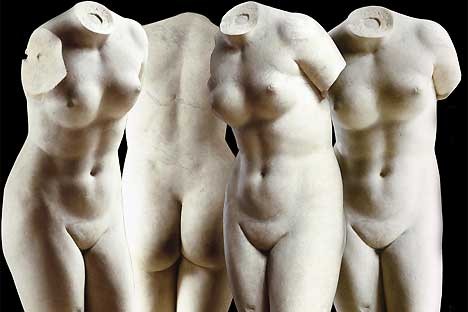

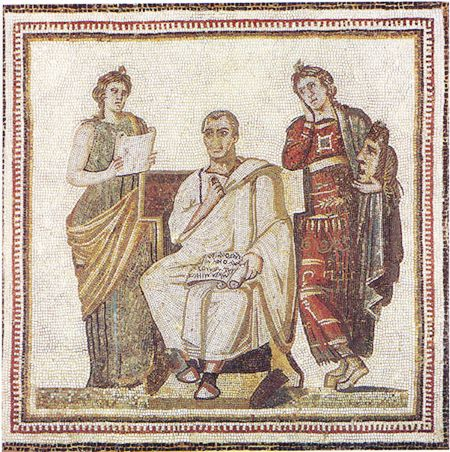
 D’abord, il est indispensable de faire justice à une illusion. Un coup de sonde dans les quarante dernières années suffit pour cela. En quoi l’enseignement du latin et du grec a-t-il pu contribuer en quoi que ce soit à l’approfondissement de la culture, sinon à sa défense ? Les élèves qui sont passés par cette étape scolaire, certes en soi passionnante, ne se sont pas singularisés dans la critique d’une modernité qui se présente comme une guillotine de l’intelligence. Ils ont suivi le mouvement. Il est presque normal que ce pôle d’excellence ait été emporté, comme tout le reste, par la cataracte de néant qui ensevelit notre civilisation. Il aurait pu servir de môle de résistance, mais il aurait fallu que la classe moyenne fût d’une autre trempe. Car est-il est utile aussi d’évoquer les professeurs de latin et de grec qui, sauf exceptions (soyons juste) ne sont pas différents des autres enseignants ? Ils possèdent, comme chacun, leur petit pré carré, leurs us et coutumes, leurs intérêts, et, généralement, partagent les mêmes illusions politiquement correctes, ainsi qu’un penchant à profiter (comme tout le monde, soyons juste !) de la société de consommation. Faire des thèmes et des versions contribue à renforcer la maîtrise intellectuelle et langagière, certes, mais cela suffit-il à la pensée ? Ne se référer par exemple qu’à la démocratie athénienne, pour autant qu’elle soit comprise de façon adéquate, ce qui n’est pas certain dans le contexte mensonger de l’éducation qui est la nôtre, c’est faire fi de Sparte (victorieuse de la cité de Périclès), de l’opinion de quasi tous les penseurs antiques, qui ont méprisé la démocratie, de l’idéologie monarchique, apportée par Alexandre et les diadoques, consolidée par le stoïcisme et le néoplatonisme, et qui a perduré jusqu’aux temps modernes. Il faut être honnête intellectuellement, ou faire de l’idéologie. De même, la Grèce et la Rome qu’ont imaginées les professeurs du XIX
D’abord, il est indispensable de faire justice à une illusion. Un coup de sonde dans les quarante dernières années suffit pour cela. En quoi l’enseignement du latin et du grec a-t-il pu contribuer en quoi que ce soit à l’approfondissement de la culture, sinon à sa défense ? Les élèves qui sont passés par cette étape scolaire, certes en soi passionnante, ne se sont pas singularisés dans la critique d’une modernité qui se présente comme une guillotine de l’intelligence. Ils ont suivi le mouvement. Il est presque normal que ce pôle d’excellence ait été emporté, comme tout le reste, par la cataracte de néant qui ensevelit notre civilisation. Il aurait pu servir de môle de résistance, mais il aurait fallu que la classe moyenne fût d’une autre trempe. Car est-il est utile aussi d’évoquer les professeurs de latin et de grec qui, sauf exceptions (soyons juste) ne sont pas différents des autres enseignants ? Ils possèdent, comme chacun, leur petit pré carré, leurs us et coutumes, leurs intérêts, et, généralement, partagent les mêmes illusions politiquement correctes, ainsi qu’un penchant à profiter (comme tout le monde, soyons juste !) de la société de consommation. Faire des thèmes et des versions contribue à renforcer la maîtrise intellectuelle et langagière, certes, mais cela suffit-il à la pensée ? Ne se référer par exemple qu’à la démocratie athénienne, pour autant qu’elle soit comprise de façon adéquate, ce qui n’est pas certain dans le contexte mensonger de l’éducation qui est la nôtre, c’est faire fi de Sparte (victorieuse de la cité de Périclès), de l’opinion de quasi tous les penseurs antiques, qui ont méprisé la démocratie, de l’idéologie monarchique, apportée par Alexandre et les diadoques, consolidée par le stoïcisme et le néoplatonisme, et qui a perduré jusqu’aux temps modernes. Il faut être honnête intellectuellement, ou faire de l’idéologie. De même, la Grèce et la Rome qu’ont imaginées les professeurs du XIX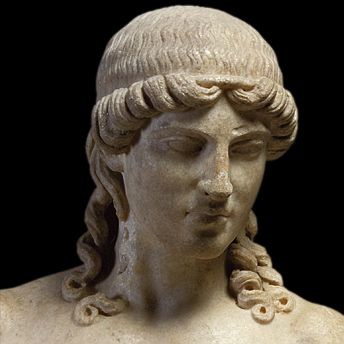
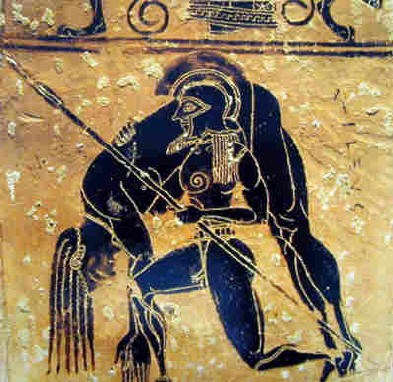 Le monde homérique est un rêve. Et comme tout rêve, il est ce que nous possédons de plus intime et de plus lointain. Rien n’est plus légitime, pour les historiens, d’y chercher des indices de réalité. Je veux parler des reflets déformés, anachroniques ou non, de relations économiques, sociales, humaines, qui traduisent des conditions de civilisations entremêlées, entre la période mycénienne – et même avant, jusqu’aux souvenirs du monde minoen – et la fin de l’âge sombre, de 1500 à 750 avant notre ère, environ. L’érudition a ses raisons, et il est donné à notre âge scientiste de considérer un legs poétique comme un document d’étude à peu près comme un autre.
Le monde homérique est un rêve. Et comme tout rêve, il est ce que nous possédons de plus intime et de plus lointain. Rien n’est plus légitime, pour les historiens, d’y chercher des indices de réalité. Je veux parler des reflets déformés, anachroniques ou non, de relations économiques, sociales, humaines, qui traduisent des conditions de civilisations entremêlées, entre la période mycénienne – et même avant, jusqu’aux souvenirs du monde minoen – et la fin de l’âge sombre, de 1500 à 750 avant notre ère, environ. L’érudition a ses raisons, et il est donné à notre âge scientiste de considérer un legs poétique comme un document d’étude à peu près comme un autre.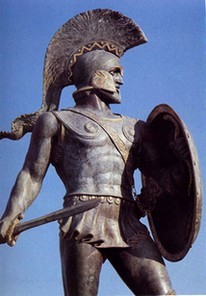 Uno degli aspetti più caratterizzanti nello studio dell’Iliade e dell’Odissea è la scoperta delle modalità da parte di tutti i personaggi che hanno un rilievo narrativo, di “entrare” in se stessi e di dialogare non solo con gli dèi che si svelano in ogni aspetto dell’accadere umano, ma anche di scrutare i propri sentimenti, di “guardare” il vasto mondo che si muove nella vita interiore. E’ una realtà particolare, non facilmente rinvenibile in altre
Uno degli aspetti più caratterizzanti nello studio dell’Iliade e dell’Odissea è la scoperta delle modalità da parte di tutti i personaggi che hanno un rilievo narrativo, di “entrare” in se stessi e di dialogare non solo con gli dèi che si svelano in ogni aspetto dell’accadere umano, ma anche di scrutare i propri sentimenti, di “guardare” il vasto mondo che si muove nella vita interiore. E’ una realtà particolare, non facilmente rinvenibile in altre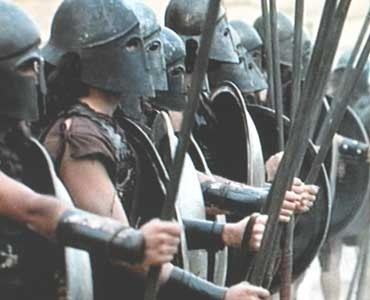 La prospettiva politica di
La prospettiva politica di 
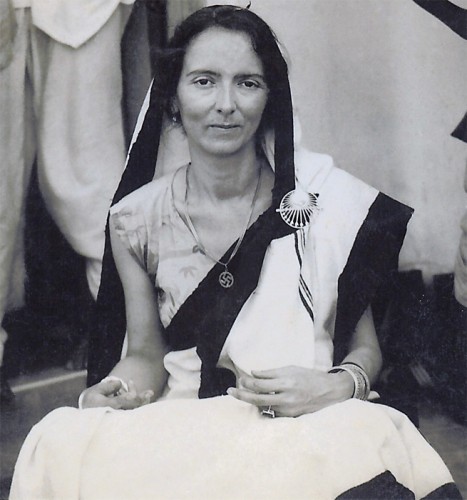
Edouard RIX
Ex: http://www.counter-currents.com/
Translated by Greg Johnson
According to this conception, which can be reconstructed through the comparison of documents from the majority of ancient Indo-European societies, any organization, from the cosmos to any human group, requires for its existence three hierarchical types of action, that I propose to call the three fundamental functions: (1) mastery of the sacred and knowledge and the form of temporal power founded upon it, (2) physical force and warlike valor, and (3) fruitfulness and abundance with their conditions and consequences.[1]
On the social plane, one finds this tripartition in the whole Indo-European realm, from India to Ireland, the three functions corresponding schematically to the priest-kings, the warriors, and finally to the producers, peasants, and craftsmen. In traditional India, the Brahmins correspond to the first function, the Kshatriyas to the second, and the Vaishyas to the third. According to Julius Caesar, in the extreme west of the Indo-European realm, Celtic society was composed of Druids, of Equites or Knights, and Plebs, the people.
In ancient Greece, however, there had been a tendency quite early on to eliminate any trace of the trifunctional ideology. According to Dumézil, “Greece is not helpful to our case. Mr. Bernard Sergent made a critical assessment of the expressions of the trifunctional structure, isolated most of the time in the process of fossilization, that one might recognize there: it is next to nothing compared with the wealth offered by India and Italy.”[2] However, an attentive reader of the works of Plato can find proof there of the survival of functional tripartition in traditional Greece.
The Platonic Ideal City
In the Republic, Plato discusses the ideal city, affirming that “the classes that exist in the City are the very same ones that exist in the soul of each individual.”[3] According to Plato’s analysis of human nature, the human soul has three parts: reason, located in the head, which enables us to think; feeling, located in the heart, that enables us to love; and desire, located in the belly, that drives us to sustain ourselves and reproduce. Each part of the soul has its own specific virtue or excellence: wisdom, courage, and temperance. Justice is the proper relationship of the three parts. According to Plato, the constitution of the city is merely the constitution of the soul writ large.
Concretely, the philosopher distinguishes three functions within the city. First, “those who watch over the City as a whole, enemies outside as well as friends within,”[4] the guardians, who correspond to the head, seat of intelligence and reason, the Logos. Then, the “auxiliaries and assistants of the decisions of the rulers,”[5] who correspond to the heart, seat of courage, Thymos. Finally the producers, craftsmen and peasants, who correspond to the belly, seat of the appetites. “You who belong to the City,” Plato explains, “are all brothers, but the god, in creating those among you able to govern, mixed gold in their material; this is why they are the most valuable. He mixed silver into those who are able to be auxiliaries, and as for the rest, the farmers and craftsmen, he mixed in iron and bronze.”[6]
Plato emphasizes that, “A city seems to be just precisely when each of the three natural groups present in it performs its own task.”[7] Indeed, just as an individual must subject his stomach to his heart, and his heart to his reason, the crafts must be subjected to the art of the warriors, who themselves must be subjected to the magistrates, i.e., to politics—this last being inseparable from philosophy, for the magistrates must become philosophers.
Plato also distinguishes three kinds of political regimes, each of which is related to the one of the functions of the city and by extension with one of the parts or faculties of the human soul. Regimes ruled by reason include monarchy, government by one man, and aristocracy, or government by the best. “Timocracy” is Plato’s term for government by warriors, which is ordered by the noble passions of the heart. Regimes ruled by the lowest passions of the human soul and material appetites include oligarchy, or rule by the rich; democracy, or rule by the majority; and tyranny, the rule of one man who follows appetite, not reason.
Without a doubt, this Platonic ideal city resting on three strictly hierarchical classes, reproduces the traditional Indo-European tri-functional organization of society. Indeed, in Greece which completely seems to have forgotten tripartition, Plato entrusts the political life of the city to philosopher-kings, the guardians, assisted by a military caste, the auxiliaries, who reign over the lower classes, the producers.
Plato is convinced that only the guardians, i.e., the sages, have the capacity to use reason equitably for the community good, whereas ordinary men cannot rise above their personal passions and interests. On the other hand, the members of the ruling caste must lead an entirely communal life, without private property or family, as well as many elements of egoistic temptation, division, and, ultimately, corruption. “Among them, no good will be private property, except the basic necessities,” decrees the philosopher, who recommends, moreover, “that they live communally, as on a military expedition,” and who among the inhabitants of the city “they are the only ones who have no right to have money or gold, or even to touch them; they are the only ones forbidden to enter private homes, wear ornaments, or drink from silver and gold containers.”[8]
“Because,” he adds, “as soon as they privately own land, a dwelling, and money, they will become administrators of their goods, cultivators instead of being the guardians of the city, and instead of being the defenders of the other citizens, they will become their tyrants and enemies, hated and hating in turn, and they will pass their lives conspiring against the others and will become the objects of conspiracy, and they will often be more afraid of their interior enemies than those outside, bringing themselves and the whole city to ruin.”[9] Moreover, their children will be removed at birth in order to receive a collective military education.
This “Platonic communism,” a virile and ascetic communism that has nothing to do with the Messianic nightmares of Marx and Trotsky, is not unrelated to the national communitarianism of Sparta. As Montesquieu put it with some justice, “Plato’s politics is nothing more than an idealized version of Sparta’s.”
Notes
1. G. Dumézil, L’oubli de l’homme et l’honneur des dieux et autres essais. Vingt-cinq esquisses de mythologies (Paris: Gallimard, 1985), p. 94.
2. Ibid, p.13.
3. Platon, La République (Paris: Flammarion, 2008), p. 262.
4. Ibid, p. 199.
5. Ibid, p. 200.
6. Ibid, p. 201.
7. Ibid, p. 245.
8. Ibid, p. 205.
9. Ibid, pp. 205–206.
Source: Réfléchir & Agir, Winter 2009, no. 31.